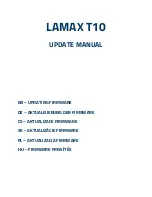
Camera Performance and Features
•
41
Those areas of the image where high roll-off is present will show higher noise levels after flat field
calibration due to the higher gain values of the correction coefficients. Flat field calibration can only
compensate for up to an 8:1 variation. If the variation exceeds 8:1 then the line profile after
calibration will include pixels that are below the un-calibrated peak level.
Note:
The Linea ML camera has many different modes of operation. It is strongly recommended that the
camera be flat fielded for that mode of operation that is intended.
Saving & Rapidly Loading a PRNU Set Only
Loading a complete user set takes approximately 800 ms while loading only the user PRNU
coefficients takes less than 200 ms.
Use the User PRNU Set Selector parameter to select the set you want to save or load. 17 sets are
available—16 user and 1 factory. Loading the Factory Set is a good way to clear the user PRNU.
The Factory Set is read-only. Loading the Factory Set is a good way to clear the user PRNU.
Save the current user PRNU coefficients using the “Save User PRNU Set” feature. Load the user
PRNU coefficients from the set specified using the “User PRNU Set Selector” and the “Load User
PRNU Set” command features.
Setting Custom Flat Field Coefficients
Flat Field (PRNU) coefficients can be custom modified and uploaded to the camera. They can also
be downloaded from the camera.
To upload or download coefficients, use File Access Control Category > Upload / Download File >
Settings and then select Miscellaneous > Current PRNU to download / upload a file.
The file format is described in the document 03-084-20133 Linea ML Binary File Format, which can
be obtained from Teledyne DALSA Technical Support. This document also includes Excel spread
sheet examples.
The PRNU coefficients are used by the camera as soon as they are uploaded. To avoid loss at
power up or while changing row settings, the uploaded coefficients should be saved to one of the
available user sets.
Flat Field Calibration Filter
See the section Flat Field Category in Appendix A for GenICam features associated with this section
and how to use them
Related Feature: Calibration Algorithm
If a sheet of material is being used as a white target, it must be completely free of blemishes and
texture.
The presence of dirt or texture will generate a variation in the image that will be incorporated into
the calibration coefficients of the camera. Further, once the target is removed, or moved, vertical
stripes will be present in the scanned image.
Dirt or texture that has dark characteristics will appear as bright vertical lines. Dirt or texture that
has bright characteristics will appear as dark vertical lines.
















































